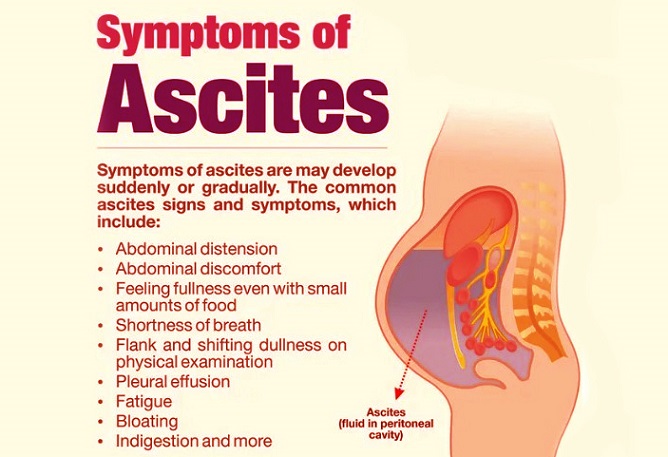Nikhil Prasad Fact checked by:Thailand Medical News Team Nov 17, 2024 4 months, 3 weeks, 4 days, 23 hours, 46 minutes ago
Medical News: Ascites, commonly associated with liver cirrhosis, is an abnormal accumulation of fluid in the abdominal cavity. While cirrhosis remains a leading cause, there are numerous non-cirrhotic causes that contribute to ascites formation, particularly in regions where infectious diseases are prevalent. Understanding these causes is vital for effective diagnosis and management. Researchers from institutions including CHU Dupuytren, Limoges, France, and INSERM U-1248 have extensively examined these less common causes. This
Medical News report will explore the findings and delve into the range of treatments available for non-cirrhotic ascites.
 French Researchers Outline Causes and Management of Non-Cirrhotic Ascites
The Complexities of Ascites Diagnosis
French Researchers Outline Causes and Management of Non-Cirrhotic Ascites
The Complexities of Ascites Diagnosis
When ascites is suspected, a detailed medical history and physical examination are essential. Blood tests are typically conducted initially, but a more direct assessment is required in some cases. Paracentesis, a procedure to obtain a sample of the ascitic fluid, provides crucial information. The appearance of the fluid itself can give clues; for example, a clear sample is typical, but if it appears milky or bloody, it could indicate a specific underlying issue like chylous ascites or infection.
Distinguishing Non-Cirrhotic Causes of Ascites
-Cancer and Malignant Ascites
Cancer is the second most common cause of ascites, particularly in cases where the disease has spread to the abdominal cavity. Ovarian, breast, and gastrointestinal cancers are among the most frequent culprits. When cancer is suspected, markers like carcinoembryonic antigen (CEA) and ascitic fluid cholesterol levels are tested. Treatments for malignant ascites can include paracentesis, peritoneal ports for continuous drainage, or intraperitoneal chemotherapy.
-Infections Including Tuberculosis
In regions where tuberculosis is common, tuberculous peritonitis is a notable cause of non-cirrhotic ascites. Diagnosing this condition involves examining white blood cell levels in the ascitic fluid and performing tests such as PCR-based methods for Mycobacterium tuberculosis DNA. Treatment typically involves a combination of antibiotics for six to nine months, though corticosteroids are not generally advised.
-Cardiac and Renal Conditions
Heart failure and renal diseases, including nephrotic syndrome, can also lead to ascites. In these cases, the fluid build-up is often due to increased blood pressure in the veins or decreased protein levels in the blood. Blood tests measuring B-type natriuretic peptide (BNP) levels are useful in identifying heart-related causes of ascites, while urine protein levels help assess kidney function.
-Gynecologic and Endocrine Causes
Certain gynecologic issues, such as ovarian cancer and endometriosis, can cause ascites, though less commonly. Endometriosis-related ascites is generally hemorrhagic, while ovarian conditions like Meigs syndrome lead
to fluid accumulation in both the abdominal and pleural cavities. Thyroid dysfunctions, both hyperthyroidism and hypothyroidism, may also cause mild ascites, typically with high protein concentrations in the ascitic fluid.
Diagnostic Tools and Treatment Strategies
A range of tests assists in diagnosing non-cirrhotic ascites. The serum-ascites albumin gradient (SAAG) is an important measure, with values over 11 g/L indicating portal hypertension-related causes. Other useful tests include ascitic fluid cholesterol concentration, lactate dehydrogenase (LDH), and markers specific to suspected conditions, such as CEA for cancer or ADA for tuberculosis.
For treatment, diuretics and low-sodium diets are commonly recommended. Specific treatments depend on the underlying cause, such as chemotherapy for malignant ascites or antibiotics for infectious cases. In certain cases, a transjugular intrahepatic portosystemic shunt (TIPS) is used to lower portal hypertension.
Study Insights and Future Directions
This study emphasizes the importance of distinguishing non-cirrhotic ascites causes, as misdiagnosis can lead to ineffective treatments. For example, treating tuberculous ascites with only diuretics would not address the infection, while using antibiotics in cancer-related ascites might be unnecessary.
Conclusion
Non-cirrhotic ascites, while less common than cirrhosis-related cases, demands a careful and thorough diagnostic approach. With a range of causes, from infections and cancer to heart and kidney disease, identifying the underlying issue is key to managing symptoms and improving patient outcomes. Researchers stress that clinicians should adopt a multidisciplinary approach, including oncologists, cardiologists, and infectious disease specialists, to provide comprehensive care for affected patients.
The study findings were published in the peer-reviewed journal: Gastroenterology Insights.
https://www.mdpi.com/2036-7422/15/4/65
For the latest on Ascites, keep on logging to Thailand
Medical News.
Read Also:
https://www.thailandmedical.news/news/abdominal-bloating:-what-is,-causes,-treatments
https://www.thailandmedical.news/news/covid-19-research-worrying-gastrointestinal-abnormalities-revealed-in-abdominal-imaging-studies-of-covid-19-patients
